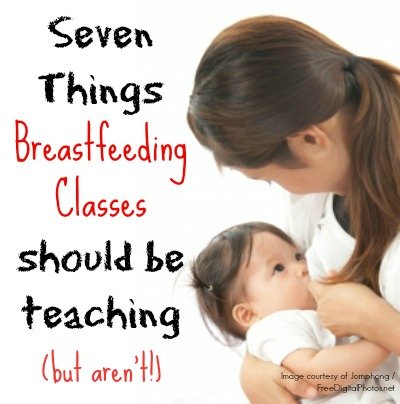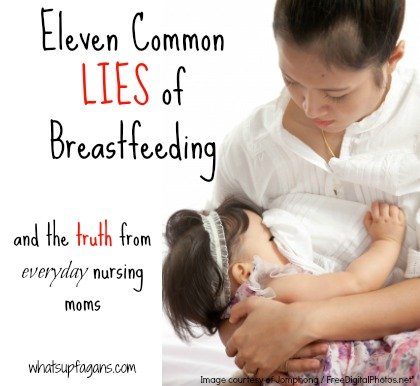If you want to save money, raise great kids, improve your marriage, or enjoy a cleaner home, then join more than 10,000 others and receive helpful tips straight to your inbox. As a thank you for joining you'll receive several FREE household printables and other great perks too! Sign up here!

I am very appreciative of all the comments and shares that my previous post 11 Common Breastfeeding Myths and Lies received. Many were grateful that I was sharing the “truth.” Because, the truth of the matter is many moms have heard those well-meaning lies from doctors, nurses, lactation consultants, and even friends and family. Breastfeeding is promoted as the best and so natural, that when it hurts way more than a woman knew it was going to, and brings never-discussed complications and realities, moms get discouraged, feel guilty, and very often completely overwhelmed by the prospect of breastfeeding. Because, what they have been taught to expect from their pregnancy and breastfeeding classes is far removed from reality.
Today I want to talk about changing those breastfeeding “lies” into things that are honestly talked about and addressed in breastfeeding classes, new mom classes, and general pregnancy classes, and even by lactation consultants themselves. So, here are. . .
1. Nursing Garments
One of the hardest things about nursing, for many women, is feeling comfortable enough to leave your house and nurse on the go. While some people and societies are fine with a woman nursing however and wherever she wants, without a cover, a lot of women are not as comfortable doing so. That’s why I think it would be worthwhile for breastfeeding classes to talk about, and even perhaps model various nursing garments, like the different nursing bras, tanks, and tops options. They could discuss the pros and cons of the different nursing garments.
2. How to cover-up.
Going along with number one, I think it would be extremely valuable to talk about and show various ways on how to modestly and discretely breastfeed in public. Several people in my Facebook thread talked about worrying about other people’s reactions, including from their own family members, to them breastfeeding. In different parts of the country, breastfeeding isn’t as common, nor are mother’s rooms and lounges prevalent. So, in order to ensure that those who choose breastfeeding can leave their house without fear of judgment, immodesty, or embarrassment, learning how to discretely cover up might make the difference between continuing on in their breastfeeding journey or stopping prematurely. A great breastfeeding class would talk about what to do if a baby hates covers too, as I know that is sometimes a problem.

3. Pumping Routines
As an expectant mother of twins, I felt my breastfeeding class and lactation consultant teacher did not explain pumping routines, at all. In fact, when asked about pumping, my teacher said that I wouldn’t need to: the body works on supply and demand, and pumping would just mess with my production. Plus, pumping would mean I’d have to wake up in the night to pump. That was crappy advice in my opinion. While I am not a medical professional nor do I completely understand all that goes on within the body to create my milk supply, I do know that when my twins were sleeping 12 hours through the night (which this instructor pretty much made sound like they never would), I woke up so sore and engorged by the morning. I therefore pumped every night before I went to bed to avoid that issue.
But, besides my unique twin experience, there are still many mothers who need to/choose to work part-time or full-time and will need to express milk in order to feed their babies breast milk. They need to know how to successfully pump. Even stay at home mothers need to know how to pump, and what type of pumping/nursing schedules people use successfully, especially if they ever want to or need to be away from the baby for more than three hours. This would be highly valuable in a breastfeeding class.
4. Breast Pumps and Insurance.
Several commenters said they wished they would’ve either had a breast pump, or had a better, double electric one. Did you know that many insurance companies will cover one? Or that many hospitals will let you rent one (essentially letting you test drive it before you buy)? This information should be in breastfeeding classes! One twin mom said “I wish I’d had the hospital grade pump provided or offered at the hospital rather than the single hand pump they gave me. Maybe we would have gotten the start we needed!”

5. What things to eat/drink to naturally increase your milk production.
I recently read the book Twin Manibreasto: A Story of Milk and Multiples by Mercedes of Project Procrastinot. And I learned from her that certain foods are actually natural milk-producers! She drank “Mother’s Milk” tea and ate oatmeal every day, along with drinking lots of water. I didn’t know that oats are one of the most notable galactagogues foods (or even what that meant!). While some tell you to shy away from such things, being a nursing mom of twins, I know I could’ve benefited from knowing about these! I often felt like my supply was low for my twins, and often supplemented with pumped milk or formula because of it.
Moms need to know that breastfeeding will hurt in the beginning, and for much longer than the first week. That’s called honesty. They also need to be taught that breastfeeding doesn’t come naturally to many new moms or their babies, and where they can go to get help. And for sure they need to know that breastfeeding is not a form of contraception.
7. That formula is not the devil.
Here’s the truth everyone – a child that is exclusively bottle-fed can still go to Harvard and become the CEO of a large corporation or president of the United States or fly to the moon. Formula is not poison, a toxin, or harmful at all to most babies. Formula is still going to feed your child the nutrients he or she needs to grow big and strong and smart and healthy and all of it! You should not feel bad for giving your child formula.
Breast milk is awesome, and is the ideal baby food, because, it was designed specifically by our bodies to feed our human babies, and it is made naturally, without the use of synthetic materials or chemicals; plain and simple that is why breast is best. But, formula is pretty great too, and formula research and development over the last century have made it very similar to breast milk and a healthy alternative to breastfeeding.
What would you have liked to have learned in your breastfeeding classes? What would have helped you be more successful (or experience less pain or grief) had you been better educated beforehand? What do you wish lactation consultants were more honest about?
Please share this post and my other post, and let’s start helping each other empower women:

If you want to know how to stop breastfeeding, then be sure to read this post:

Original article and pictures take www.whatsupfagans.com site
Комментариев нет:
Отправить комментарий